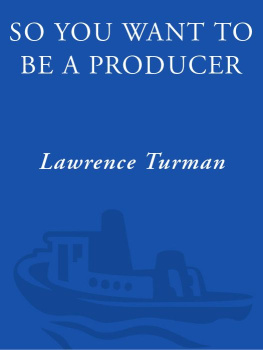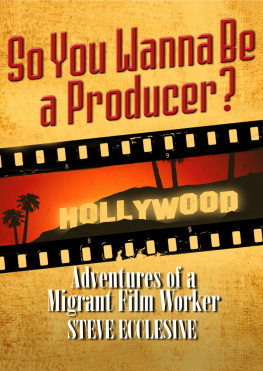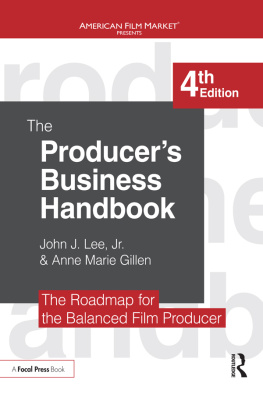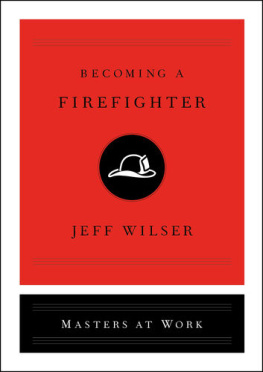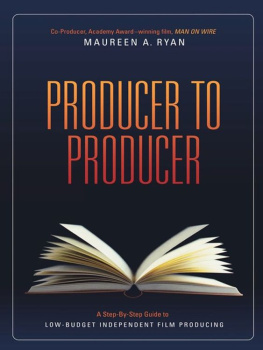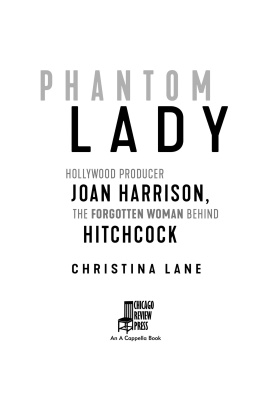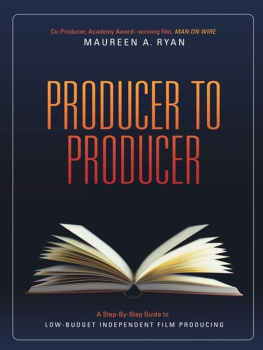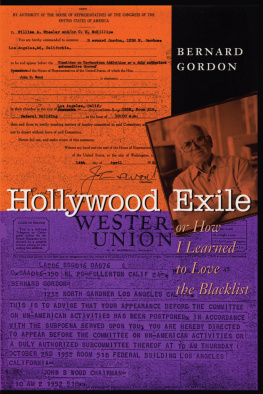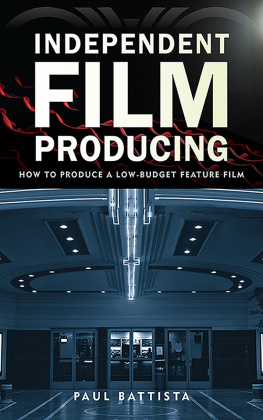Every single line of this book was word-processed by Richard Shepherd. His research, advice, counsel, and much-needed support were, and are, invaluable. Im not sure I could have done this book without him.
Its commonplace to thank ones editor and agent, and that annoys me because when I now do the same it dilutes the unparalleled respect and affection I feel for mine. Ive been truly blessed with and by each. Becky Cabaza, my editor, I thank as much for her nurturing emotional support as for her clear-eyed, superlative editorial help. Betsy Lerner, my agent, who tapped me on the shoulder to write this book and along the way gave me much, and often needed, practical and psychological support. I complained my way through the process, but I owe Betsy for having come into my life.
I also want to acknowledge Michael Cieply who, on his own initiative, decided to write the New York Times story about the Peter Stark Producing Program, which got Betsys attention.
PREFACE
Ive produced more than forty movies, yet never once thought about my intended audience when starting one, though I probably should have. As Im starting this book, however, I am thinking about you, my intended audience, as Ive been given a mandate as to what to write about: How To Produce. Ive been through all the steps, many times, but each time it seems different. It is different. Actually, thats one of the beauties, one of the joys of producing.
I will let you in on a secret: Whenever I get a green light to make a movie, I am elated, of course, but I also become nervous and insecure. How do I do this? What am I supposed to do? What should I do first? Why isnt there (as my old writer friend Herb Gardner said) a grown-up around to tell me? Truly, no kidding. It is such a formidable task to start a film from scratch, to build an entire design and manufacturing team, and to produce a prototype product that you have no idea whether anybody wants, and then, when youre done, to break it all up and disband the whole operation. And, hopefully, get more chances to do it all again. At the beginning, all I can think about is how much there is to be done.
So why am I writing this book? A top New York literary agent and successful author, Betsy Lerner, contacted me out of the blue, asking if I would be interested in writing a book about producing. For years my three adult sons had implored me to write such a book. Once, about ten years ago, I actually did try. I would write for an hour every morning before work, but I didnt have a clear idea of what to write about, and thus did more procrastinating than writing. I quit after a month. Betsy, on the other hand, did know exactly what she wanted, and why she wanted me. She had read a very laudatory New York Times story about The Peter Stark Producing Program at USC, which I have headed for fourteen years, and which is arguably the preeminent producing program in the world. The Times story centered on the many great successes of my very first graduates and noted my own producing history, including The Graduate. Betsy wrote that she had been looking for some time for the right person, and she felt I was the one. Youd be surprised how well flattery works, Oscar-nominated director Stephen Daldry (The Hours) said about his work methods. Right on! I immediately faxed Betsy: Yes! Because as much as I love producing and want to motivate, educate, and inspire, its not exactly brain surgery. So, at the same time, I also want to demystify producing. Pinned on the bulletin board behind my desk is Hitchcocks quote, Dont panic. Its only a movie.
I do know how to produce, as my filmography at the back of this book will attest. I always know what kind of film I want to make, the people who can help me make it, and all the steps needed to get there. Im still in the game, in the trenches, after forty-five years. Thus I organize a very practical curriculum for my students in The Peter Stark Producing Program. Its so practical, in fact, that the class content is as much like a trade school as what it is: a two-year Master of Fine Arts degree. Where do you find a story? How do you control it? How do you develop it? Where do you get the money? How do you make the movie? How do you sell it? Thats the stuff I teach them, and the stuff I will cover in this book.
The reality is that there is no one right waynot even necessarily a best wayto produce a film. I guarantee you Jerry Bruckheimers methods and means differ from mine. His work is great for him and for audiences around the world, which is the object of the exercise. My methods have worked for me, toofor a long time and for a lot of movies. The plain fact is that each producer works a little bit differentlysometimes more than a little bit. Ive interviewed many of the best of them for this book, and youll often see their commonalities, and sometimes their differences.
In writing this book I relearned a somewhat surprising but valuable lesson: Ive had more defeats than victories. Yes, I had any number of scripts that I fervently believed in, but could not get financing for. Ive also produced many films that I believed in, though the finished products did not set the world on fire. Yet Ive enjoyed a very successful career, both by absolute and relative measure. As every old pro says, its about survival. Similarly, I am proud of how I have conducted myself personallywith integrity, dignity, and at least a modicum of good taste. I believe how you choose to live each day is the single most important determinant of any success you have in life.
In this book Im going to tell you what Ive lived through, seen, and learned about producing. Ive chosen the title So You Want to Be a Producer because How To is not the art of it. Rather, I hope that when you finish reading youll feel this is a Can Do book.
A really nice bonus in writing this book were the things I learned during the many interviews with my fellow producers. All were wonderfully candid and forthcomingindeed, I could not have written this book without thembut above and beyond that, to my surprise and pleasure, they all proved to be instructive and, Ill be damned, inspiring to me. Each made me proud to be his or her colleague. I remember a moment thirty-five years ago, after my success with The Graduate, when I was sitting in the Twentieth Century Fox commissary and a voice whispered in my ear, Im proud to know you; Im proud to be in the same business. I turned and saw the great actor Henry Fonda.
Without exception, every single producer I interviewed made me want to emulate him or her. Each had a great attitudemuch better than mineabout so many things. Even at this late stage of my life, Im going to try to adopt their wisdom for myself: Dick Zanucks physical discipline; Saul Zaentzs acceptance that theres always someone smarter than he; Bill Goldmans and Frank Piersons outspoken candor; David Browns comfort in aging; Christine Vachons fearlessness; Brian Grazers clarity about himself; Kathleen Kennedys values and clear overview; and more (for filmographies of the producers interviewed, see the contributor credits section at the end of this book). I rediscovered that one learns by doing, just as in producing.

